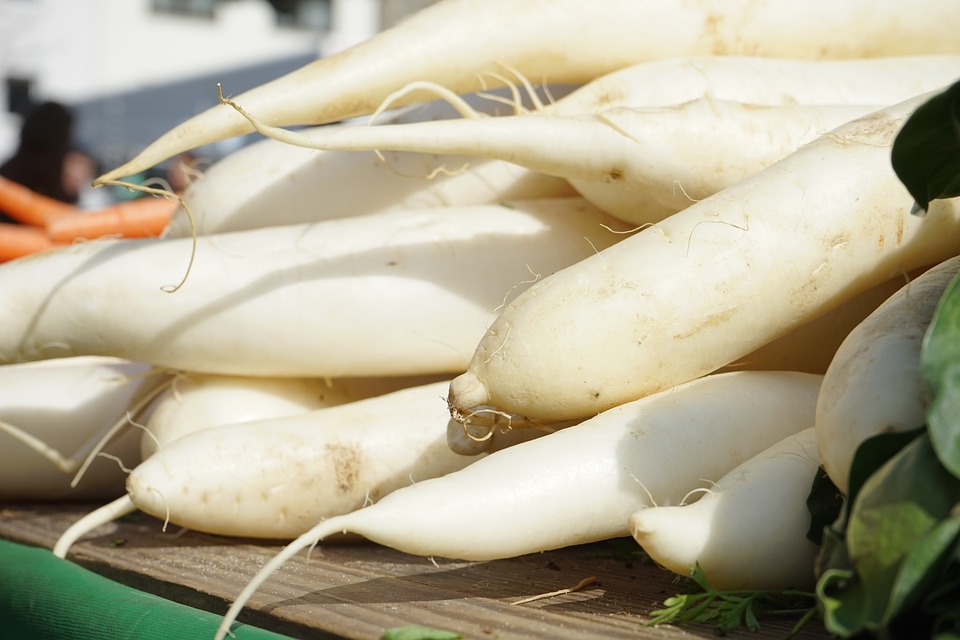A cross between turnips and radishes, with a spicy touch and the typical crunchiness, Daikon is a vegetable widely used in oriental gastronomy. You will get to know it much better by reading this article!
What is Daikon?
Daikon is a kind of hybrid between radish and turnip. This white radish, native to Southeast and East Asia, is grown mainly in North America. Its name in Japanese means big root, and you can also find it with names like white radish, winter radish, and oriental or Japanese radish.
Its size can vary between 5 and 35 centimeters, and there is even an immense variety that can weigh more than 40 kilos and measure up to half a centimeter.
In Japanese dishes, it is widely used to make pickles and as part of traditional ponzu, while in China, it features delicious dishes such as Lo Bak Go and Chai tow kway. It’s also widely used in Vietnamese, Pakistani, Korean, and Indian dishes, and of course, it can also be added to your cuisine.

Some Characteristics of Daikon
- Daikon is unique in one dwelling. It does not absorb heavy metal salts, nitrates, and pesticides from the soil. Therefore, it can be safely eaten without fear of harmful substances. In addition, the benefits to the body of the Japanese radish are great.
- This large root is very low in calories and can contain less than 20 calories per 100 grams. Its taste is intense, slightly spicy, and its texture crisp. You can also benefit from the whole plant as its leaves are a luxury in salads.
- Daikon is rich in vitamin C. It can provide up to 27% of the total recommended amount per day, and it is also rich in vitamin B. It is anti-inflammatory and calming; it also provides potassium, calcium, phosphorus, fiber, and iron.
- Like all cruciferous flowers, it is an excellent antioxidant and purifying.
- Stimulates appetite.
- Protects the liver and facilitates digestion.
- Thanks to its anti-inflammatory and antiviral effect, it is recommended to treat respiratory diseases, coughs, flu, and others.
- Promotes sleep; its calming properties have been used since ancient Greece. A glass of daikon juice before you go to bed, and you’re guaranteed sleep.
- Cleanses the body. People have long noted that the root has a powerful diuretic effect. And the laxative effect is mild and proper, unlike the usual black radish. That’s why fans of cleansing diets and adequate nutrition appreciate and respect the Japanese radish.
- It is a diuretic and natural laxative that helps detoxify your body. Moreover, the diuretic effect is obtained due to the content of potassium and calcium salts in daikon juice. Therefore, traditional medicine treats them for stones and sand in the kidneys. According to reviews, the method has a fantastic success but not in the period of acute illness!
- It is ideal for treating problems such as acne and pimples, both internally and externally. For the skin. Daikon juice and a decoction of parsley perfectly lighten freckles, pigment spots. They also lubricate problem skin that is prone to acne breakouts. There have been cases where traditional medicine has even cured old boils using dressing soaked in Japanese radish juice.
- Diluted juice contributes to the rapid healing of wounds, cuts, and lacerations; you only need to rub the injury a few times a day. Or just make a dry dressing with a juice-soaked bandage.

As you can see, the traditional properties of this vegetable and daikon juice can help fight various types of diseases and inflammations, so adding it to your dishes will always be a pro. Besides, its high content of Vitamin A and iron makes it the perfect companion to give a little life to your dishes!


